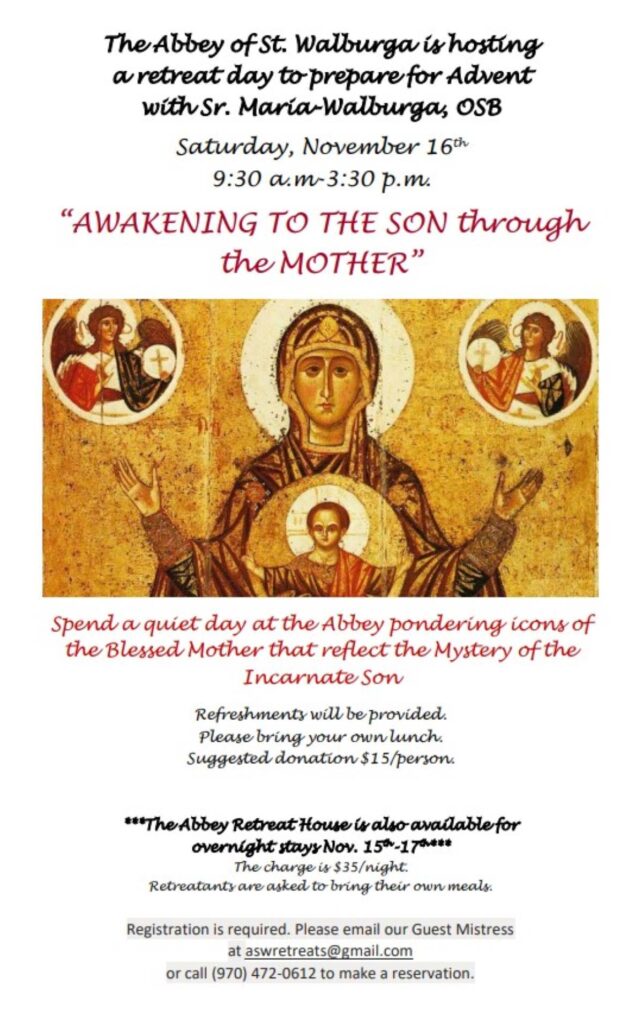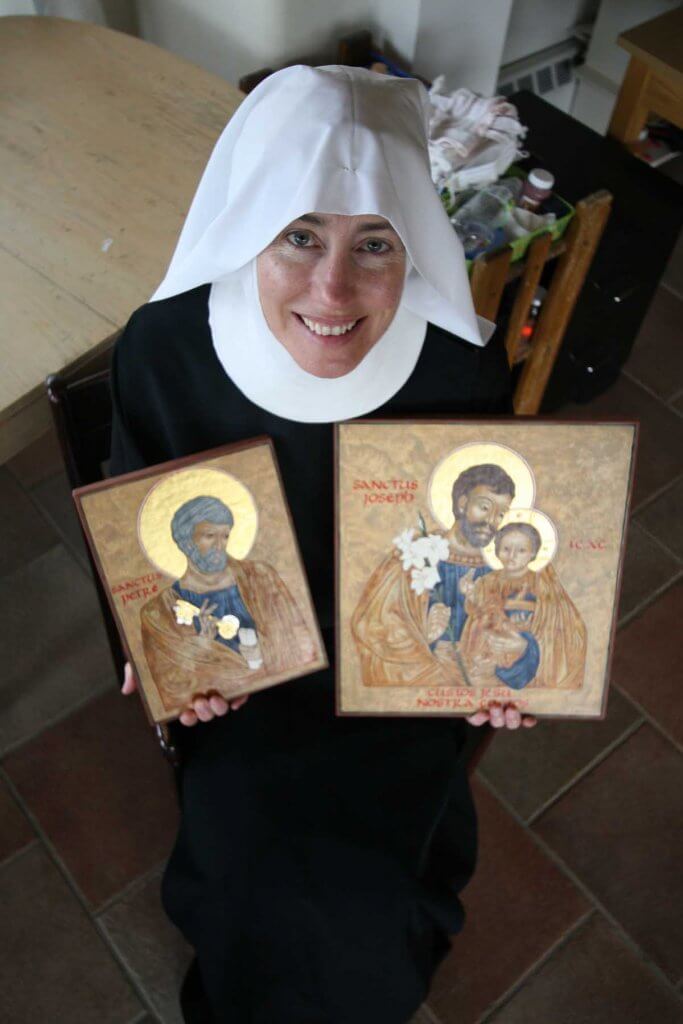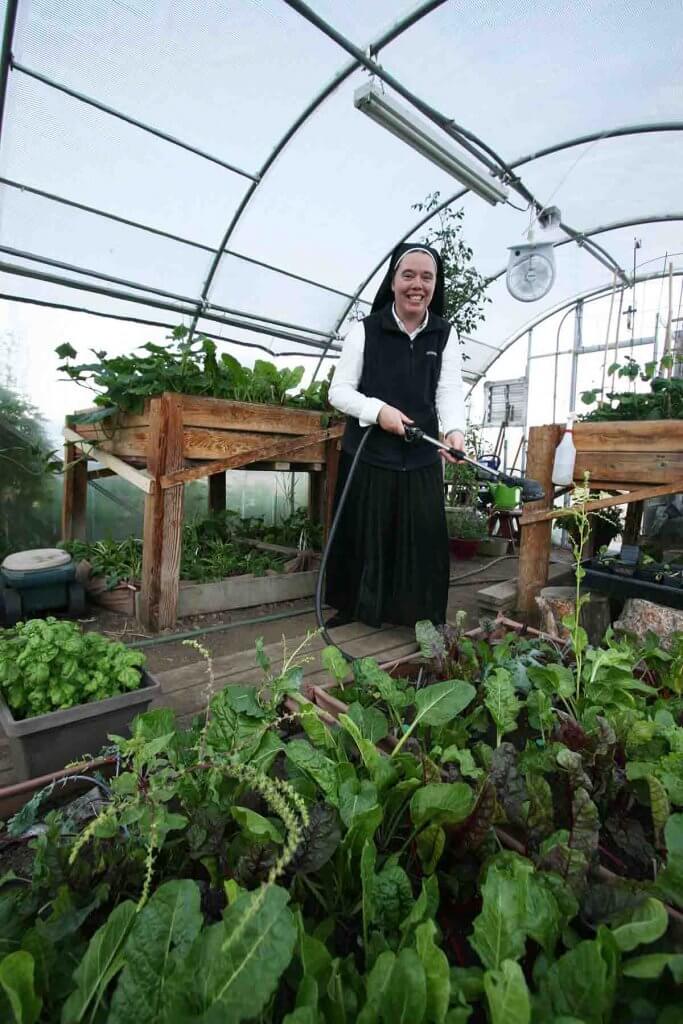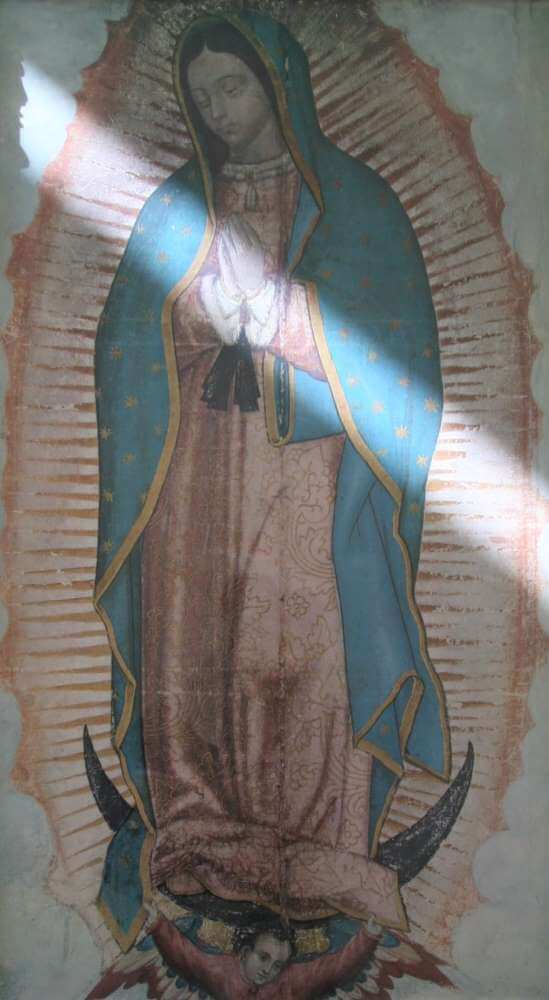*Note: This year’s Advent Retreat has reached capacity

*Note: This year’s Advent Retreat has reached capacity

A reflection by Mother Maria-Michael Newe, OSB
We are so blessed to have Mary as our Mother, our Queen Mother, whose joy it is to intercede for God’s people. She’s a Mother who understands us – Mary knows us, our history, our situation, and what our deepest needs are. She knows what God poured into us at our conception, and with what excitement the Trinity beheld each one of us and wondered, “What will she do with this? How will she live these gifts out?”
It reminds me of how the other day I was so thrilled to pick a little fig off of our fig tree. What a joy! It makes me think of how God sees us: The whole tree can be full of figs, but He picks one and is so joyful over it. Each one is a joy when you pick it. Each one is a joy when you see it. And you, too, are a joy for God. You, too, have a “yes”. You, too, have gifts poured into you; so acknowledge them, and then run to Christ and say, “Thank you.” Because then not only will Mary intercede for us, but she will also be able to tell God of our gratitude.


The Loving Heart of my God thought of my soul, loved it, and prepared endless means to promote its salvation, even as though there were no other soul on earth of which He thought; just as the sun shines on each spot of earth as brightly as though it shone nowhere else, but reserved all its brightness for that alone. So Our Dear Lord thought and cared for every one of His children as though none other existed. “Who loved me, and gave Himself for me,” St. Paul says, as though he meant, “for me alone, as if there were none but me He cared for.”
Saint Francis de Sales
On March 25, the Annunciation of the Lord, Sister Maria renewed her monastic vows for another year. Join us in praying for her, as her next step will be making her Solemn Profession next year!

During the celebration of the Eucharist on that day, some of our Sisters sang a motet called “Dixit Maria” by Hans Leo Hassler, in honor of Mary’s response to Gabriel’s message. The video features their singing, along with the tapestries hanging in our chapel woven by a nun from Abtei St. Walburg in Eichstätt, Germany:
Tearful Adam with his sorrowing family begs this of you, O loving Virgin, in their exile from Paradise. Abraham begs it, David begs it. All the other holy patriarchs, your ancestors, ask it of you, as they dwell in the country of the shadow of death. This is what the whole earth waits for, prostrate at your feet. It is right in doing so, for on your word depends comfort for the wretched, ransom for the captive, freedom for the condemned, indeed, salvation for all the sons of Adam, the whole of your race.
In Praise of the Virgin Mother by St. Bernard (Hom. 4, 8-9: Opera omnia, Edit. Cisterc. 4 [1966], 53-54)
Answer quickly, O Virgin. Reply in haste to the angel, or rather through the angel to the Lord. Answer with a word, receive the Word of God. Speak your own word, conceive the divine Word. Breathe a passing word, embrace the eternal Word.
Why do you delay, why are you afraid? Believe, give praise, and receive. Let humility be bold, let modesty be confident. This is no time for virginal simplicity to forget prudence. In this matter alone, O prudent Virgin, do not fear to be presumptuous. Though modest silence is pleasing, dutiful speech is now more necessary. Open your heart to faith, O blessed Virgin, your lips to praise, your womb to the Creator. See, the desired of all nations is at your door, knocking to enter. If he should pass by because of your delay, in sorrow you would begin to seek him afresh, the One whom your soul loves. Arise, hasten, open. Arise in faith, hasten in devotion, open in praise and thanksgiving. Behold the handmaid of the Lord, she says, be it done to me according to your word.
A reflection on Luke 10:38-42 by Mother Maria-Michael Newe, OSB
It ran through my mind today that Martha was not able to listen to Jesus when serving because she was so mad at Mary. She wasn’t hearing a word He said—she was too busy thinking, “Look at her, she just sits there all day, and I have to do this, I have to do that, look at how unfair it is!” We can recognize this pattern in our own lives: doesn’t it happen that when we’re angry, disturbed, not happy with life, we are not longer able to hear Christ? Our conversation is one-sided, because we’re just complaining to Him, like Martha did. We need to stop and listen, too. If we don’t, we can let disturbances steal our peace of heart, steal our focus, and have say over what’s important in the moment. It takes a lifetime to figure out the answers to the questions, “Why do I give this thing such importance? Why do I let it steal my peace of heart and mind? Can I just let it go?” There are some things we need to address, and there are other things that maybe we need to just let go.
Pictured below, Sisters prepare the meal and wash the dishes without grumbling or complaining!






On September 11, the eve of the day on which the Church commemorates the “Holy Name of Mary,” our Sister Mary was clothed with the Benedictine habit. What a glorious day it was!
Two days later, a wildfire broke out from a lightning strike on our neighbor’s land, and we spent the day preparing to evacuate. Thankfully, due to the amazing fire fighting squad (on foot and in the air), who worked tirelessly through the night, we were able to safely stay in our monastery. We were also blessed by many friends and oblates who reached out to check on us and let us know that we could stay with them if we needed to leave. Praise the Lord for surrounding us with so many good people!
It was a great gift that we did not have to evacuate, because Sister Assunta’s Vow Renewal was set to take place on the next day, September 14, The Feast of the Exaltation of the Holy Cross. After six years here, she has now renewed her vows for another year, bringing her one step closer to her Solemn Profession.
In honor of the Feast of the Exaltation of the Holy Cross celebrated this month, one of our Sisters wrote this reflection:
You have said To plant in fertile ground With rich, nutritious soil, In order to take root And bear fruit; But then You go and Contradict Yourself, Because I’ve seen Trees growing out of rocks, For nothing is impossible For You… And it’s a good thing, too, Because I am like that rock, Stony, hard, unloving, Critical, rigid, cold, But still You give me hope That if I only keep saying, “I only want You, And to love like You,” Then You will accomplish A miracle in me, And a tree will grow From this rock… And I think of Moses Striking the rock, And water pouring forth, Just like You were struck By me on the Cross, And blood and water Poured out love and mercy Upon this very rock Who struck You… So there is hope For this heart of stone, Because beneath your Cross, Watered by Your blood, Anything is possible, And even a fruit-bearing tree Can grow.

I will give you a new heart, and a new spirit I will put within you. I will remove the heart of stone from your flesh and give you a heart of flesh.
Ezekiel 36:26
Between battling the weeds, caring for the cattle, and tending the gardens, summer tends to be a busy season for us; but because of our monastic horarium that provides sacred time for prayer, the balance of “ora et labora” keeps our priorities in check.





A reflection by Mother Maria-Michael Newe, OSB, on how Mary shows us the way to love beyond our hurts

The Office of Readings for the Feast of Our Lady of Guadalupe is so important. We see how Juan Diego is called tenderly by Mary to accomplish a special mission for the Church “in words both gentle and courteous.” That is really the speech of heaven—gentle and courteous. We should try to remember that and take it on as well. She calls Juan Diego to build a church so that people may “call upon and confide in me.” That is the call of the Blessed Mother. It’s as if she said, “Confide in me, and I will help you. Do not be afraid to tell me the things deepest in your heart. I will bring you to God.” That call hasn’t changed. She is incredibly loving toward the deepest sinners, because those are the ones to whom God says, “I want you, and I’m not letting go.”
Juan Diego approaches the bishop about building the church, but he is rejected. The next time he needs to pass over the same hill where he met Our Lady, he tries to skirt around the place where he met her last. What’s so beautiful is that the Blessed Mother takes no offence, she simply goes to the other side and meets him with a tender, “Juanito!” It is so lovely how heaven lets us be people, doesn’t hold our humanity against us, but simply goes to meet us where we are. She makes roses miraculously appear on the hilltop and asks him to cut them and bring them as a sign to the bishop to prove God’s will. She sends him forth, calling him her “ambassador, very worthy of trust.”
I pray that she would say the same to each one of us: “You are my ambassador, very worthy of trust.” If you hear those words, can you embrace them, and act accordingly? When you ask a sign from heaven, not because you lack faith, but because you really want to do God’s will, receive it and shout for joy. Embrace it as a total gift. Our Lady truly cares. When you confide in her and ask her help, believe me, she does not leave you alone. And even if you should run round the hill to skirt her, she will just simply run sweetly to the other side and call you. Let us all follow the Blessed Mother’s example of meeting each other where we are, and not having unreasonable expectations for others that lead to us being impatient and frustrated. Remember that “as you judge, so will you be judged, and the measure with which you measure will be measured out to you,” (Matthew 7:2). So let us be generous in loving one another, even when we feel disappointed or hurt. When you decide to forgive people, you do not have to feel warm and fuzzy toward them, no, your love has to be deeper than that. You have to make up your mind that you want what is best for them, for their healing and salvation, and that you will one day be together in heaven as the people you were created to be. Healing from wounds is a lifetime of work, and we should try to support, not hinder, each other from this process. St. Benedict says in his Rule to pray for the troubled brother suffering from illness of the soul… and who of us is not this brother from time to time? We all need each other’s’ prayer and good will. It is my hope that the next time the occasion arises for you to shut down because someone offended you, you remember Our Lady of Guadalupe and decide to run to meet the person on the other side of the hill with a kind word and a smile.
Click here to read more about the miracle of Juan Diego’s tilma
A reflection by Mother Maria-Michael Newe, OSB, on the Solemnity of the Assumption of the Blessed Virgin Mary, celebrated every year on August 15

The meaning of the Solemnity of the Assumption of Mary is that of culmination and a new beginning. With Our Lady’s assumption into heaven, the promises of the Lord were fulfilled for her and as always, beyond all expectation. I would have loved to have seen Mary’s face at her arrival into heaven. She saw her Son under the horror of the Cross; and I’m sure that never left her heart. But now she gets to see the glory of her Son and she shares in that. Remember that as she came to heaven, she was body and soul—she had an expression on her face. And that expression has never left her. The beauty of her Son seated on His throne…
The word “assumption” comes from the Latin word “assumere,” meaning, “to take to oneself.” Our Lord Jesus Christ took Mary home to Himself where He is. Now, on Mary’s part, it was the work of a lifetime of being watchful and ready to preserve the deifying light in her soul. In the Prologue of the Rule of St. Benedict, we hear, “Let us open our eyes to the light that comes from God.” Mary never took her eyes off of the light that comes from God, her Son. Further on in the Rule it says, “Run while you have the light of life, that the darkness of death may not overtake you.” Well we could say that Mary ran the marathon of life and outran sin! She never stood around long enough for sin to “attach” itself to her. There was no selfishness in Mary for sin to cling to. And isn’t most sin about selfishness? And while we also remember that Mary is the sorrowful Mother, her sorrow was never about herself. Mary’s sorrows have only to do with anything that separates us from the love and life of Christ. It would be good for us to imitate Mary in knowing true sorrow instead of selfish sorrow.
There is a story, that perhaps you have heard, of a very holy woman who would serve God’s people during the day without ceasing to pray. She would go to bed late at night but would get up early every morning to continue to serve. And when she would get up in the morning, as soon as her feet hit the floor, hell shook and said, “Oh no, she’s up!” I pray that could be said for every one of us. But for that to happen, we have to live like Mary—attentive to the body of Christ, attentive to one another, attentive to everything that separates anybody from the love of Christ and His life.
Mary’s assumption did not mark the end of her service. On the contrary, her service could now assume its universal work. We read in Lumen Gentium that “taken up to heaven, she did not lay aside this saving role, but by her manifold acts of intercession continues to win for us gifts of eternal salvation. By her maternal charity, Mary cares for the brethren of her Son who still journey on…” And Mary cares for us. Let us do nothing that would grieve the immaculate heart of Mary. Let us live in her presence.
As we celebrate the Assumption let us make our house a place where Mary wants to dwell. That takes work and it takes love. Mary suffered, but she loved more than she suffered. Like Mary, we too have to pay more attention to what we love than to what we suffer.
“Then we who are alive, who are left, will be caught up together with them in the clouds to meet the Lord in the air. Thus we shall always be with the Lord. Therefore, console one another with these words.”
1 Thessalonians 4:17-18